UK government coronavirus decision making: key phases
As the UK government’s response to coronavirus has evolved, it has made a number of changes to the crisis machinery, forums of science advice, and dec
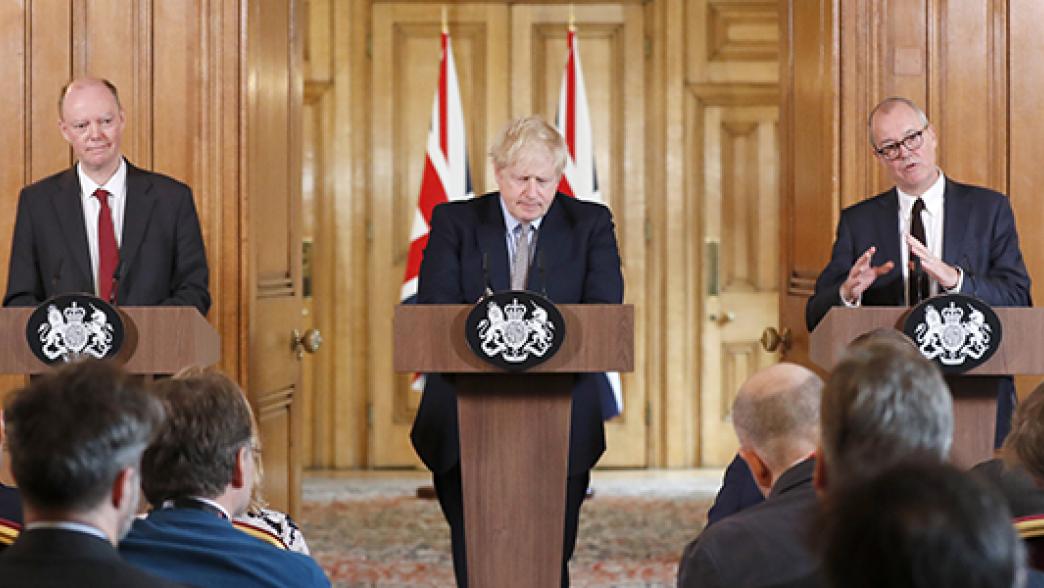
As the UK government’s response to coronavirus has evolved, it has made a number of changes to the crisis machinery, forums of science advice, and decision-making bodies at the heart of government. Decisions by the UK government were focused on the response in England on many aspects. The Scottish, Welsh and Northern Ireland administrations developed different decision-making structures, though some of the UK machinery was also focused on co-ordination between the four nations.
Since the first discussions about the virus’s spread in early January, there have been four main phases to the UK government approach.
Phase 1: January to February 2020
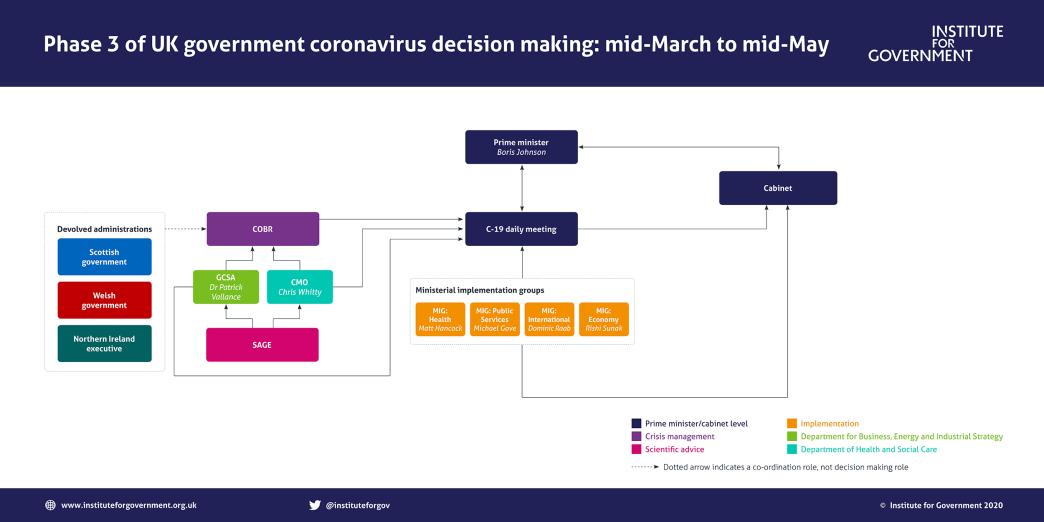
In the earliest phase, from January and during the course of February, as Covid-19 spread around the world, the Department of Health and Social Care, under Health Secretary Matt Hancock, played a leading role in the government response.
A COBR (Cabinet Office Briefing Rooms) meeting on Covid-19 was first held on 24 January. This was the main forum for crisis handling, intended to bring together all ministers, officials and agency staff relevant to the subject. The early COBR meetings are believed to have been chaired by Matt Hancock, as the initial response was led his department, NHS bodies and Public Health England. Other ministers will have attended at various points, but COBR meetings and their participants are not normally publicised. Alongside key ministers and officials, ministers from Scotland, Wales and Northern Ireland also began attending COBR meetings on 24 January, to ensure cross-UK co-ordination.
After criticisms of the prime minister for not chairing COBR for its first five meetings, No.10 said that Boris Johnson was kept in touch ‘throughout’. He chaired his first COBR meeting on 2 March.
The Scientific Advisory Group for Emergencies (SAGE) first met as a precautionary measure on 22 January, led by the government chief scientific adviser (GCSA), Sir Patrick Vallance, and the chief medical officer (CMO), Chris Whitty. SAGE is an ad hoc committee that brings together government scientists and officials with external experts. It initially reported into COBR, though. The GCSA and CMO would also have reported to their own home departments, to cabinet and to the prime minister.
Phase 2: March 2020
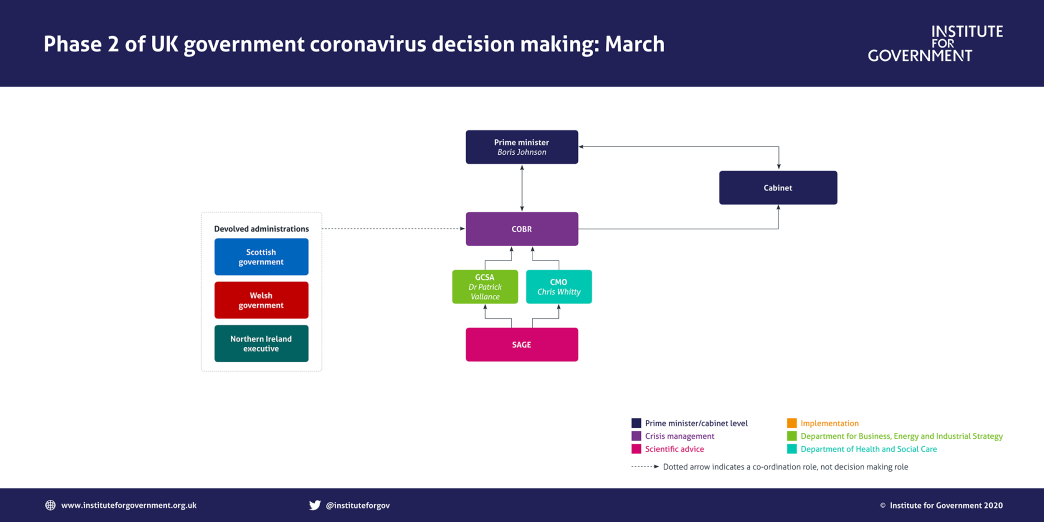
This was perhaps the most acute phase of the crisis, as the scale of infection in the UK spiralled and the government initiated a lockdown of the whole country. COBR seems to have been the main forum for decision making in this period, but the prime minister would have held daily meetings with his team and other cabinet committees and the cabinet itself and its committees will have discussed the aspects of the response.
The prime minister first chaired COBR on 2 March, and from March the first ministers of the devolved nations were usually in attendance. Devolved governments also engage with the UK response through the established networks of chief medical officers and chief scientific advisers to the UK and devolved governments. COBR meetings at this time were both a co-ordination forum for the whole of UK, including the devolved governments, but at other times the decision-making meetings led by the prime minister.
SAGE met 10 times during March. SAGE also serves the devolved administrations, with chief medical officers or other representatives also sitting in on its meetings. There are a range of subcommittees that sit underneath SAGE.
Phase 3: Mid-March to mid-May 2020
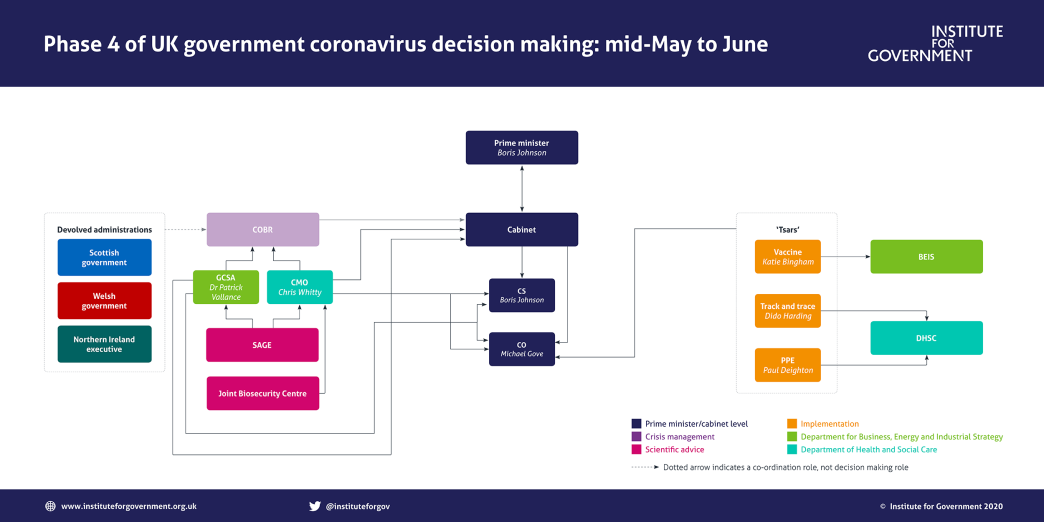
In the lockdown period, the prime minister began daily Covid meetings (C-19). This was a daily cabinet committee with a smaller group of senior ministers and officials, but with a larger cast dialling in and observing.
Around 17 March, ministerial implementation committees (later called ministerial implementation groups, MIGs) were developed in four key areas: health was chaired by the secretary of state for health and social care, Matt Hancock; public services chaired by the minister for the Cabinet Office, Michael Gove; economic response was chaired by the chancellor, Rishi Sunak; and international aspects chaired by the foreign secretary, Dominic Raab. Other cabinet ministers attended the ministerial implementation committees, but not all ministers and the wider cabinet were closely involved in all of the day-to-day decisions.
According to the 17 March government announcement on the ministerial implementation committees, COBR was still supposed to be the place where ‘strategic decisions’ were made. The C-19 daily meetings would ‘monitor progress’ and ‘refine measures’ agreed by COBR, with the implementation committees feeding into the C-19 meeting. By May, the C-19 meeting appears to have become the dominant decision-making body, as it was later revealed that COBR had not been meeting from 10 May onwards. Both C-19 and the MIGs, as cabinet committees, could take decisions themselves, so not everything was reported upwards from the MIGs to C-19, or from C-19 to cabinet.
This was also the period in which the prime minister stepped away from government decision making for several weeks, having fallen ill with Covid-19. During the prime minister's time in intensive care from 7 April and in his recovery afterwards, the Foreign Secretary Dominic Raab chaired many of the meetings that would otherwise have been led by the prime minister, including both C-19 and cabinet. Decisions were taken collectively by cabinet ministers.
SAGE continued to play an important role. Although it was originally intended as an ad hoc forum for the early stages of a crisis, feeding into COBR, it carried on as a key forum to bring external scientific expertise into the heart of decision making. The CMO and GCSA both attended the C-19 regularly and other meetings as necessary.
Phase 4: Mid-May to June
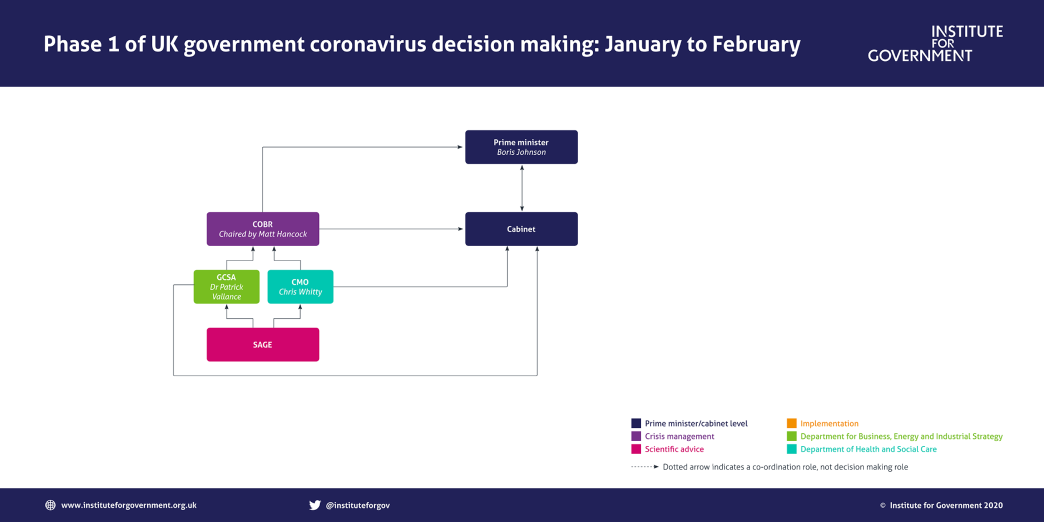
As the country began to exit from full lockdown, decision making was streamlined around the prime minister and a series of changes were made in an effort to tackle some of the ongoing problems of implementation.
On 11 May, the government’s ‘recovery strategy’ for easing lockdown announced that a new Joint Biosecurity Centre would be developed to ‘provide real time analysis and assessment of infection outbreaks at a community level’. The government said that the JBC would advise the chief medical officer of any changes to the alert level for the risk to public of Covid-19, with the CMO then advising ministers. In early June, the government acknowledged that the JBC was still being developed and would not be up and running until September.
During April and May, changes were also made to decision making to increase the emphasis on implementation. Three taskforces would be led by individuals directly appointed by ministers to tackle some of the pressing challenges of the UK’s coronavirus response: Personal Protective Equipment (PPE) provision would be overseen by Paul Deighton, developing the track and trace programme is overseen by Dido Harding - with both reporting to the Department of Health and Social Care as well as to relevant cabinet committees. A vaccine task force under Kate Bingham reports to the Department for Business, Energy and Industrial Strategy. On 22 May, Simon Case was appointed as permanent secretary to 10 Downing Street with a particular focus on co-ordinating and implementing the government’s Covid-19 response.
In early June, the government moved away from the four ministerial implementation groups, and the daily C-19 meeting. Instead, cabinet committees for Covid strategic response (CS) and Covid operational issues (CO) were developed to mirror the model used for Brexit no-deal preparation in late 2019. The prime minister chaired the CS meeting and Michael Gove chaired the CO meeting. Other ministers, particularly those most closely involved with the coronavirus response, also sat on these, though not all cabinet ministers attended them. The attendance list for these meetings was published on 29 June.
- Topic
- Coronavirus
- Keywords
- Cabinet committees Health
- Devolved administration
- Scottish government Welsh government Northern Ireland executive
- Publisher
- Institute for Government